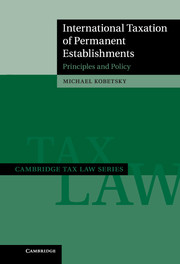Book contents
- Frontmatter
- Contents
- Abbreviations
- 1 Introduction
- 2 International taxation: policy and law
- 3 Some shortcomings of the tax treaty system
- 4 History of tax treaties and the permanent establishment concept
- 5 The role of the OECD Model Tax Treaty and Commentary
- 6 Defining the personality of permanent establishments under former Article 7 and the pre-2008 Commentary and the 2008 Commentary
- 7 Intra-bank loans under the pre-2008 Commentary and 1984 Report
- 8 Intra-bank interest under the 2008 Report
- 9 Business restructuring involving permanent establishments and the OECD transfer pricing methods
- 10 New Article 7 of the OECD Model and Commentary
- 11 Unitary taxation
- 12 Conclusion
- Bibliography
- Index
11 - Unitary taxation
Published online by Cambridge University Press: 07 September 2011
- Frontmatter
- Contents
- Abbreviations
- 1 Introduction
- 2 International taxation: policy and law
- 3 Some shortcomings of the tax treaty system
- 4 History of tax treaties and the permanent establishment concept
- 5 The role of the OECD Model Tax Treaty and Commentary
- 6 Defining the personality of permanent establishments under former Article 7 and the pre-2008 Commentary and the 2008 Commentary
- 7 Intra-bank loans under the pre-2008 Commentary and 1984 Report
- 8 Intra-bank interest under the 2008 Report
- 9 Business restructuring involving permanent establishments and the OECD transfer pricing methods
- 10 New Article 7 of the OECD Model and Commentary
- 11 Unitary taxation
- 12 Conclusion
- Bibliography
- Index
Summary
Introduction
Developments in communications and information technology have provided international enterprises with the capacity to operate internationally, through either subsidiaries or branches, as highly integrated businesses. Allocating the profits of these international enterprises to the jurisdictions in which they operate for tax purposes is a complex issue. The reason this task is so challenging is that the profits of an integrated international enterprise have no geographic source. The OECD Model and its Commentary use the arm's length principle to allocate profits between associated enterprises operating internationally or within international enterprises operating abroad through branches. Globalization has created an integrated international economy, and the implications of this development for the international tax rules are profound.
An alternative method of allocating profits from international transactions to jurisdictions is unitary formulary apportionment, which treats an international enterprise operating through branches or a group of companies as a unitary business. Unitary formulary apportionment avoids the problems of assuming the economic independence of each part of an international enterprise and the problems of transfer pricing which are inherent in the current tax treaty system. While unitary formulary apportionment overcomes some of the problems associated with the arm's length principle, it also has a number of shortcomings. Moreover, unitary formulary apportionment has not been tested at an international level. The European Union (EU) has recognized the flaws in the bilateral tax treaty system and in transfer pricing, and the European Commission is considering comprehensive reform measures, such as implementing a multilateral tax treaty using formulary apportionment. This is an exciting and promising prospect for international tax reform.
- Type
- Chapter
- Information
- International Taxation of Permanent EstablishmentsPrinciples and Policy, pp. 393 - 429Publisher: Cambridge University PressPrint publication year: 2011



